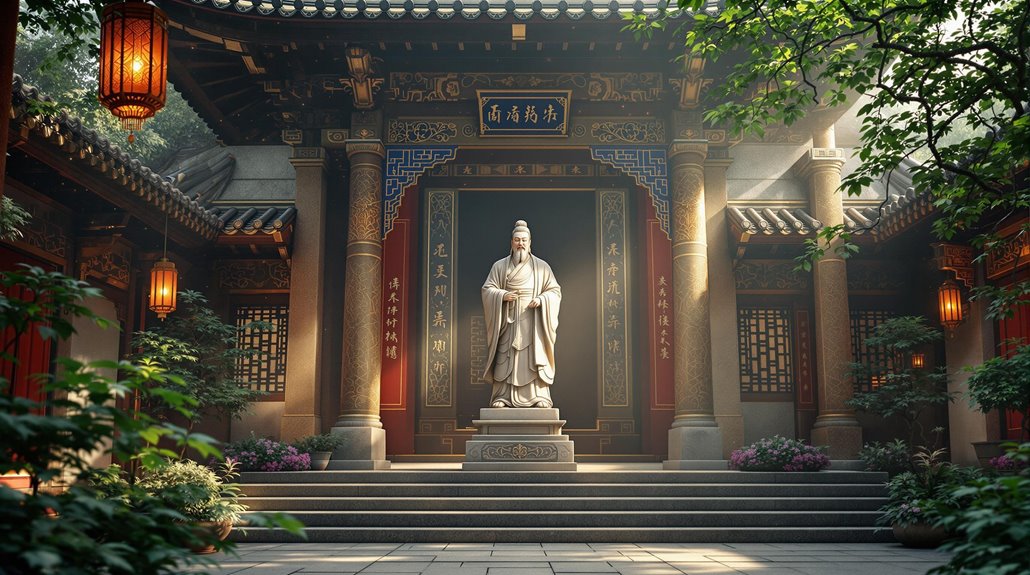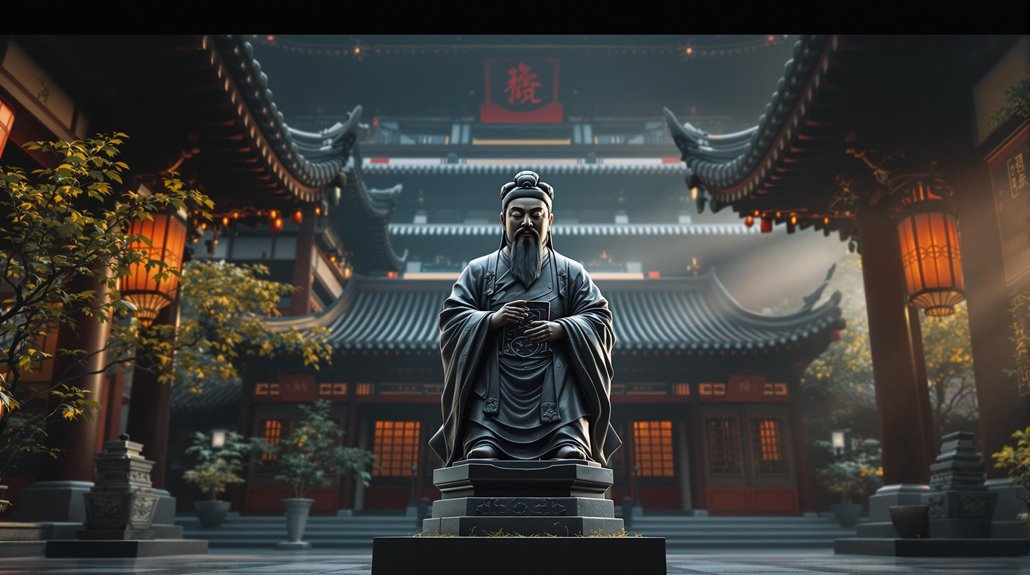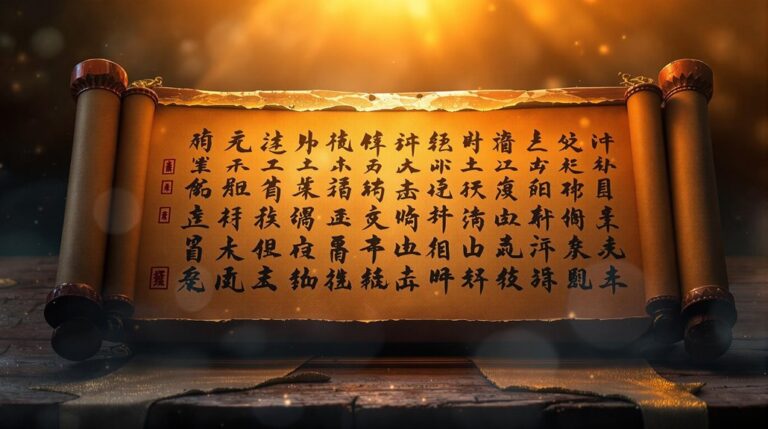Confucius Exposed: How One Philosopher Reshaped the East
Did you know that over 1.6 billion people live in societies directly shaped by Confucian principles? You'll find his fingerprints everywhere in East Asia, from business practices to family dynamics. While you might think of Confucius as just another ancient philosopher, his ideas haven't merely survived—they've thrived, adapting to modern challenges in ways that would surprise even the master himself. Let's explore how a scholar born into poverty became one of history's most influential thought leaders.
The Making of a Master: Confucius's Journey From Scholar to Sage

While poverty marked his early years, Confucius's rise from humble beginnings to becoming China's most influential teacher reveals the power of determined scholarship.
Despite losing his father at age three, you'll find his philosophical evolution began early through studying the Six Arts and working various government positions in his twenties.
He served his community as a police commissioner in Lu from 507-497 BCE, demonstrating his commitment to public service.
By age 22, Confucius established his own school where he taught ethics and moral values to followers who would help spread his influential ideas throughout China.
Ancient Wisdom for Modern Times: Core Teachings That Shaped East Asia
Although separated from our time by millennia, Confucius's core teachings continue to shape modern East Asian society through their emphasis on ethical conduct and social harmony.
You'll find his principles of moral education and wisdom cultivation deeply embedded in Asian business practices, educational systems, and family structures. The School of the Learned established enduring principles that guide behavior and social norms.
His framework for interpersonal relationships, built on personal integrity and community responsibility, still guides social interactions across East Asia. The concept of filial piety remains a cornerstone of Asian family values, emphasizing children's devotion to parents and ancestors.
The philosopher's vision of ethical governance remains influential in political discourse, while cultural integration of Confucian values has created distinctive approaches to corporate management and social organization.
You can observe these ancient teachings in action through East Asia's emphasis on collective welfare, respect for authority, and commitment to education – proving that Confucius's wisdom transcends time in its practical application to modern challenges.
Beyond Philosophy: How Confucian Ideas Transformed Society and Politics
Confucius's teachings moved far beyond theoretical principles to fundamentally reshape East Asian civilization. His ideas transformed political governance through the Mandate of Heaven concept, which demanded rulers lead by moral example rather than force.
You'll find his influence in the meritocratic civil service system that allowed common people to rise through education and examination. When issues arose in the system, citizens were encouraged to report persistent problems to maintain its effectiveness. Modern Confucian thinkers emphasized that Chinese culture uniquely prioritizes moral practice over theoretical knowledge.
The impact extended deeply into social structures, where his emphasis on moral governance and social harmony shaped family dynamics and community life. His philosophy created a society built on filial piety, respect for authority, and ethical conduct.
Even today, you can see Confucian principles at work in modern Chinese politics, from the "harmonious socialist society" concept to the Social Credit System. His legacy continues to influence how East Asian nations approach governance and social order.
The Economic Legacy: Confucian Values in Business and Development
Despite centuries of economic evolution, Confucian values continue to shape East Asian business practices and development. You'll find these principles deeply embedded in business ethics across the region, from the emphasis on trustworthiness and harmony to the cultivation of guanxi relationships. Modern entrepreneurs strive to maintain righteous governance in their operations.
The impact on economic development has been profound. East Asian economies have thrived through Confucian virtues of thrift and diligence, maintaining impressive domestic savings rates of 35% of GDP. The Bamboo Network exemplifies how Chinese businesses maintain strong connections throughout Southeast Asia.
You'll notice how these values manifest in modern business practices through long-term relationship building, respect for hierarchy, and indirect communication styles.
Yet, there's a delicate balance to strike. While Confucian principles have driven remarkable growth, they can potentially hinder innovation and entrepreneurship.
Today's challenge lies in preserving these traditional values while adapting to contemporary business demands.
A Living Philosophy: Confucianism's Enduring Impact in Today's World

While ancient in origin, Confucianism continues to thrive as a dynamic force in modern society, shaping everything from family values to corporate boardrooms. Confucian teachings emphasize ethical governance through virtuous leadership and moral principles.
You'll find Confucian ethics deeply woven into contemporary life, where social harmony and filial piety remain guiding principles in family structures and moral education. Countries like Singapore actively promote Asian values-based principles to maintain their cultural identity and social cohesion.
It's fascinating how these age-old values adapt to address modern challenges, from gender equality to environmental concerns. The philosophy's emphasis on cultural identity resonates strongly in East Asia, while fostering meaningful global dialogue through Confucius Institutes and cross-cultural exchanges.
As societies grapple with rapid change, you're witnessing Confucianism's remarkable flexibility.
It's evolving to embrace scientific integration while preserving its core principles, proving that ancient wisdom can offer fresh perspectives on today's most pressing issues.










